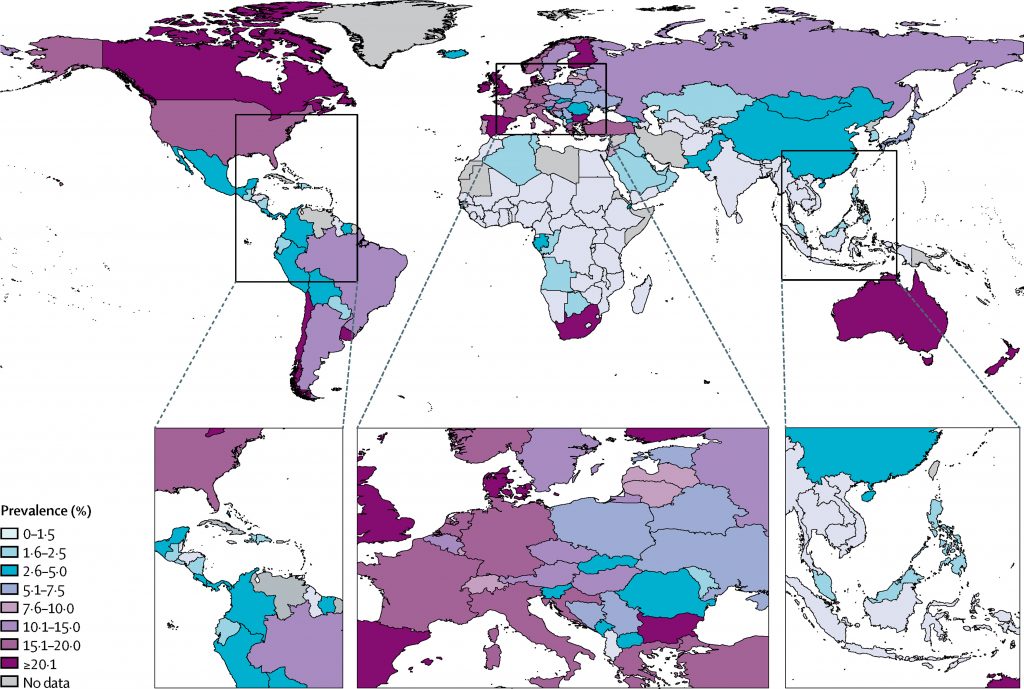In this series of articles, next, I would like to discuss food and drinks that can increase some specific compounds in the pregnant women’s blood and these compounds can be harmful to developing baby.
Caffeinated drinks
Caffeine is the most widely consumed psychostimulant. It prevents drowsiness and improves cognitive alertness. Caffeine has been part of our diet for almost 1000 years. Whether it is good for health or bad, that is debatable. As there are some serious arguments on both sides, I will delve into those some other day.
When we hear caffeine, coffee is the first thing that comes to mind. However, there are many other caffeine-containing beverages and products such as tea, chocolate, cocoa beverages, soft drinks, energy drinks and some medications. Despite having so many sources, for most of us, most of the caffeine in our diet comes from coffee. Many of us are addicted to it. I’ve had friends who couldn’t start their day without downing one or two mugs of coffee first thing in the morning and then a couple more as the day goes by. It begs the question if there are any safe limits of caffeine intake?
In May 2015, The European Food Safety Authority published a “Scientific Opinion on the safety of caffeine“. It was reported that an adult person can have up to 400mg of caffeine per day without increasing their health safety risks. This limit is 200 mg/per day for pregnant and lactating women. The UK food standard agency’s guidelines are also based on this report. Similar recommendations are published by the US Food and Drug Administration (FDA) and Food Standards Australia New Zealand (FSANZ). Whereas, the Canadian government suggest up to 300mg of caffeine per day to pregnant, breastfeeding women and women who are planning to become pregnant.
Next question is how much caffeine there is, in a mug of coffee? That depends on the type of coffee, how dark it is roasted, how fine it is grounded, how long it is brewed and how much quantity is used. However, upon doing some online search, I found some common variety of coffee and their caffeine content.
| Drinks | Caffeine in mg |
| Brewed coffee (8oz) | 70-140 |
| Instent coffee (1-2 tsp) | 30-90 |
| 1 Espresso shots | 63 |
| Decafe | 0-7 |
Many popular coffee drinks are made by adding espresso shots in warm milk such as Flat white, Cappuccino, Americano, Latte etc. Thus, their caffeine content depends on the espresso shot added to your mug. Please note that many cafes add two shots in a large mug of latte. Even though, it would be just 120 mg caffeine in a large mug of latte. Now you must be thinking, if I take one coffee a day, I will be alright. Again it depends, please have a look at this list before making this decision. The Center for Science in the Public Interest published a list of the caffeine content of various commercially available food and drinks.
Caffeine can pass through the placenta and reach the growing fetus. There are some studies that reported that excessive intake of caffeine is linked to increased fetal heart rate, premature delivery, low birth weight and miscarriage. But then questions have been raised on the credibility of those finding and there are studies that do not report any such association. Which means we can argue for hours and come to no conclusion. Moreover, please note that despite all the confusion, most of the health care organisations unanimously suggest to avoid or reduce caffeine consumption during pregnancy and breastfeeding.
Even though there are guidelines, Caffeine tolerance varies from person to person. Mine is very low. Even a single mug of coffee makes me jittery and cause palpitation. Many people experience constipation, acid reflux and poor digestion. Coffee also reduces the absorption of many nutrients such as iron. I absolutely love coffee, nonetheless, I have my reasons to keep my coffee intake next to negligible. I steal a few sips from my hubby’s mug and that’s enough to satisfy my coffee-loving taste buds.
Black tea and Herbal tea
Tea also can add to your total caffeine intake, like a cup of green tea can have up to 33mg of caffeine and it reduces the absorption of folic acid. In some countries, such as Turkey, Iran and England where tea is a popular drink, black tea is the main source of caffeine.
Herbal tea is considered healthy and a humble drink during winter to keep you warm. And many of them are good for pregnant women. Most popular of them is ginger and lemon tea, as it helps with nausea. You can buy its tea bag, but I find it best to make it with fresh ingredients. Some herbal teas are considered risky for pregnancy if consumed in excess.
Cinnamon tea, peppermint tea and jasmine tea if consumed in excess may cause mild uterine contraction, which is particularly not good during the first trimester of pregnancy. Similarly, hibiscus tea, sage tea, aloe tea are also not considered safe during pregnancy. Any herbal concoction that can cause uterine contraction, promote menstrual bleeding or act as laxative or diuretic, should be avoided during pregnancy. This page has an extensive list of herbal remedies to be avoided during pregnancy.
Also, tea is the main source of Tannins. Tannins are polyphenolic compound and occur in the roots, wood, bark, leaves, and fruits of many plants. The four main types of tea – white, black, green, and oolong – contain tannins. Where black tea has the highest levels and green tea lowest. Tannins contents of a tea also depend on the quality of tea and brewing time. Tannins are another controversial compound in our diet, as it has positive as well as the negative impact on our health. The biggest concern with tannins is that they reduce the absorption of iron in our body, a key nutrient for pregnant women. Also, tea can cause nausea and acid reflux if consumed empty stomach.
Alcohol
Sometime you might hear that having an alcoholic drink once in a while during pregnancy is OK. When you look up, you will see that there is no safe limit of alcohol during pregnancy. Most of the organisations will suggest you to stop drinking when you are trying to get pregnant or when you know you are pregnant.
Even a small amount of alcohol can pass through the mother’s blood, cross the placenta and reach your developing baby’s blood. How much alcohol will cause what harm to your baby is not published with certainty, however, it is well recorded that more your drink, greater the harm.
Fetal Alcohol Spectrum Disorder (FASD) is a term used to explain a range of alcohol-related birth defects. FASD not necessarily will be detected at the birth but can cause health and behavioural issues later in life. If you are keen to learn more on this topic, please check this link.
No mother intentionally wants to give their kids a bad start in life, despite that there are a huge number of children born with FASD around the world. In my understanding, there could be four reasons:
- Lack of knowledge and understanding of serious consequences of alcohol consumption on baby
- Lack of control or will power
- Lack of motivation or support
- Addiction
In overcoming all above mentioned reasons, support from the health care system, family and friends is crucial. NHS website has a list of organisation that provides support.
Smoking
Pregnant or not, smoking is bad for smokers as well as people around them. If the pregnant woman smokes or use a nicotine product or if people smoke near her, the poisons in the tobacco will affect the baby and the baby’s development. There is a plethora of literature available on this topic online or in the maternity unit of your hospital. Hence, anything written under this heading would be either a cliche or common knowledge, if not unnecessary repetition. Hence I am not going to explain this any further. In case you are interested please feel free to have a look at following writeups
- Stop smoking in pregnancy by NHS
- Stopping smoking is the best thing you can do for your baby by NHS
- What happens when a pregnant woman smokes? by Tommy’s
- Smoking during pregnancy by NCT
- Smoking and pregnancy by Royal College of Obstetricians and Gynaecologists
- Myths: Smoking and Pregnancy by National Cancer Institute (NCI), USA
And if you think smoking during pregnancy is not common please have a look at this image that shows the prevalence of smoking during pregnancy around the world. Do you see a pattern here? Higher prevalence in some continents such as America, Europe and Oceania, than others!

This article suggests lots of control and quitting. Good luck!

